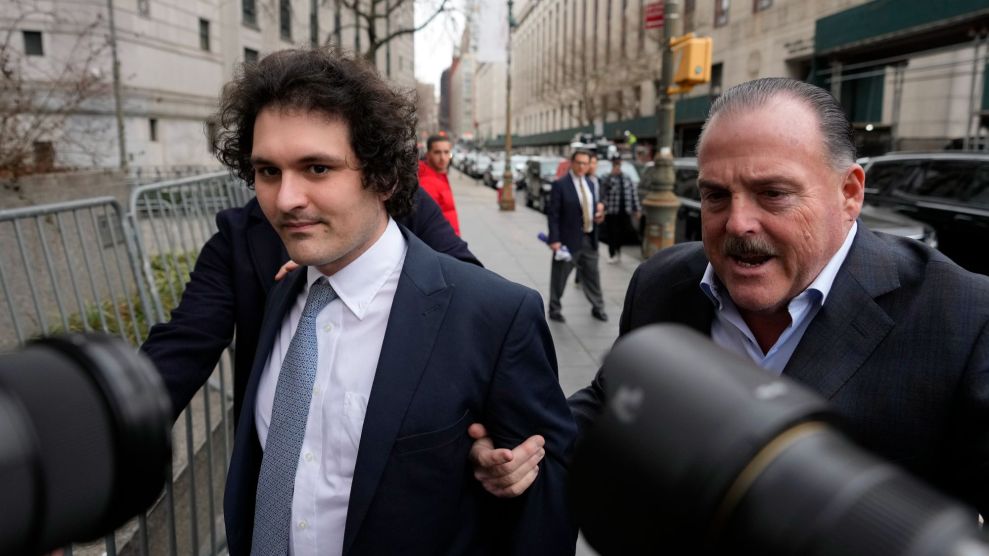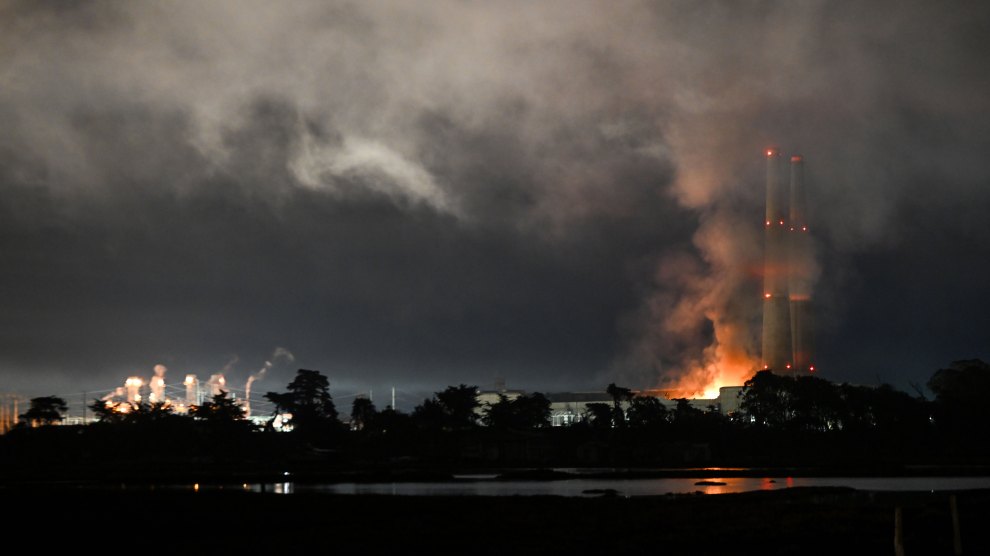
John Minchillo/AP
On Thursday prosecutors updated their indictments against former crypto billionaire Sam Bankman-Fried, expanding on allegations the feds initially filed in December. Bankman-Fried ran the now-collapsed FTX crypto-trading platform and made a name for himself as a disheveled, casually dressed boy genius. He made no secret of his desire to use his new wealth to support Democratic candidates. According to campaign finance records, in 2022 he was a prolific donor—the sixth largest overall—who contributed more than $36 million to mostly Democratic candidates and causes. But the indictments on Thursday, which added four new campaign finance charges to the one that was filed last year, seem to support a story that Bankman-Fried began telling after FTX’s collapse. They suggest that Bankman-Fried actually donated far more money than was previously known—to politicians on both sides of the aisle—but that he hid much of it.
According to the new indictments, Bankman-Fried made “over 300 political contributions, totaling tens of millions of dollars,” that were illegal because they were made through another donor giving on his behalf—an arrangement known as a straw donor. The exact total isn’t cited, but the new filing does note that internal bookkeeping records at Alameda Research—an investment firm that Bankman-Fried also operated and which investigators say improperly mixed its assets with FTX’s—suggest that as much as $100 million may have been set aside for political contributions.
One key thing that’s missing from all of this is the names of the recipients of all that money—and, more importantly, whether they were aware of the alleged scheme. Straw donor schemes are not that unusual; during every election cycle, several are discovered and prosecuted. The reasons for using straw donors vary. Sometimes the goal is to exceed the legal limits on how much a donor can give to a candidate, and other times the purpose is to hide from the public eye who a politician’s financial backers really are. According to the new indictment, Bankman-Fried was mostly concerned about the latter and used two different employees to make donations for him—one to give to lefty candidates that Bankman-Fried didn’t want to be publicly associated with, and the other to give money to Republicans.
“All my Republican donations were dark,” Bankman-Fried said in an interview after FTX’s collapse. “The reason was not for regulatory reasons, it’s because reporters freak the fuck out if you donate to Republicans. They’re all super-liberal, and I didn’t want to have that fight.”
Again, according to the indictment, Bankman-Fried’s intentions were to use his donations to influence politicians. At one point, federal prosecutors are alleging, a political consultant working for Bankman-Fried told the FTX executive charged with donating to progressive candidates and groups that they had to donate $1 million to support a candidate who was linked to LGBTQ causes. The consultant wrote in a message to the executive that “in general, you being the center left face of our spending will mean you giving to a lot of woke shit for transactional purposes.” The executive balked, but the indictment says that on Bankman-Fried’s orders, the donations were made.
Donations made for “transactional purposes” could themselves be illegal—campaign finance law says that donations can’t be made in exchange for a quid pro quo. In fact, that’s known as bribery. All the more reason, from Bankman-Fried’s perspective, to keep the donations hidden. But contributions that are so large and so frequent and made for “transactional purposes” also raises the possibility that—unless they were made completely ineptly—the beneficiaries of the donations may well have known who was really supplying the money and why.
Recipients of straw-donor schemes are rarely held accountable when prosecutors file charges. There are a variety of reasons for that, including a general reluctance to charge elected officials and the difficulty of proving their knowledge of the true source of the money. But the schemes also rarely involve such large sums of money—it’s much harder to say a politician didn’t know about donations as large as those Bankman-Fried is alleged to have made, especially when there’s apparent evidence that the donor was so focused on “transactional purposes.”
Of course not all of the money went directly to campaigns—some of the largest donations were apparently to super-PACs, which are not legally allowed to coordinate their activities with candidates. But candidates are often very aware of who the super-PAC donors are. In fact, candidates often fundraise for the super-PACs directly. Whether the money went to a candidate or to a super-PAC supporting candidates, if Bankman-Fried made the donations with “transactional purposes” in mind, it means a lot of politicians likely knew what he was doing.
If Bankman-Fried really did direct as much as $100 million to support politicians across the political spectrum—and everything about Bankman-Fried and his calculations is a big “if” at this point—it’s increasingly difficult to see how those who took the money shouldn’t be held accountable as well.
















